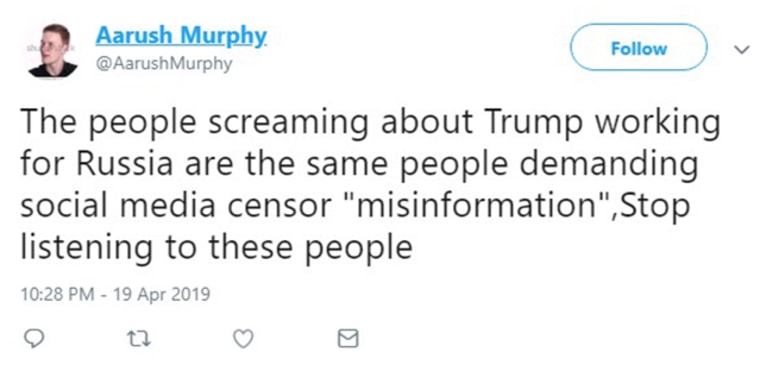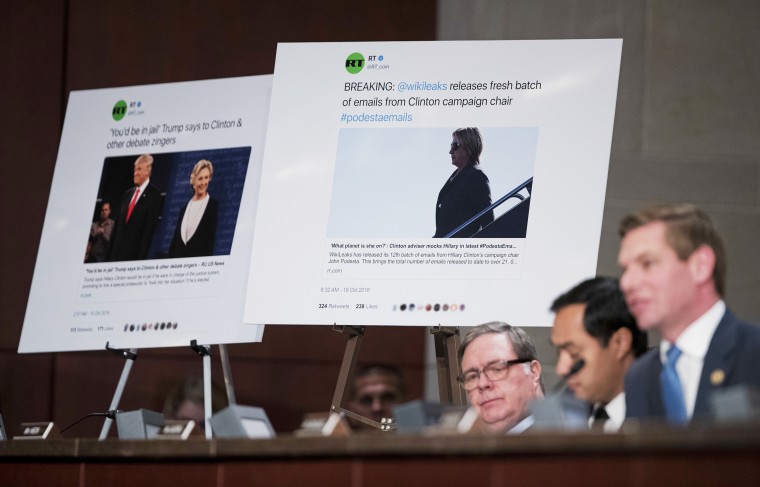A network of more than 5,000 pro-Trump Twitter bots railed against the “Russiagate hoax” shortly after the release of special counsel Robert Mueller’s report last week, according to data gathered by a prominent disinformation researcher and analyzed by NBC News. The network illustrates the ongoing challenge Twitter faces in persistent efforts to manipulate its platform.
These bots, however, did not appear to come from Russia. Instead, the bots had ties to a social media operation that previously pushed messages backing the government of Saudi Arabia and were connected to a person who claimed to be a private social media consultant, according to internet domain and account registration records. The bots, which were created last November and December, were pulled down by Twitter on Sunday night for breaking the social network’s rules against “manipulation,” the company said.
As social media platforms continue to prepare for the 2020 election, efforts to spread disinformation and sow discord remain an ongoing issue. And while operations sponsored by foreign countries are still a threat, the rise of for-profit trolling operations, which may include the new bot network, have added a new element for companies to counter.
“The landscape has changed,” said Clint Watts, a senior fellow at the Foreign Policy Research Institute who focuses on global disinformation campaigns. “Since 2016, everybody’s doing this. It’s trolling as a service. And since there are no consequences, the least sophisticated of all the actors are doing this.”
Almost all of the since-removed accounts, most of which only posted about 30 times each, attacked the press and lamented how the “Russiagate hoax” affected Trump’s presidency. Many of the accounts copied verbatim tweets from other pro-Trump accounts without attributing those tweets to the original poster.

The thousands of accounts are tied together by their frequent interactions — including likes, retweets and copied tweets — with a recently rebranded account called @TheGlobus, which posed as a news organization. Thousands of the accounts appeared to exist solely to “like” articles from @TheGlobus on Twitter, many only “liking” tweets from @TheGlobus and no other account.
Until its rebrand last month, @TheGlobus went by the username @ArabianVeritas and mostly posted positive news, policy initiatives and memes about Saudi Arabian Crown Prince Mohammed bin Salman.
It is unclear whether the accounts had any official connections to the government of Saudi Arabia.
“Whether this is a government or a pro-Saudi influence firm, it shows how easy it is to do and that there’s no cost or consequences for it,” Watts said. “These are made to influence Americans or Western audiences.”
Arabian Veritas called itself “an initiative that aims to spread the truth about Saudi Arabia and the Middle East through social media engagement” on its abandoned Instagram account. Despite rebranding as a news organization — though it shows no evidence of employing journalists and its website is broken — the account remained a “verified user” on Twitter.
The domain name for Arabian Veritas was registered to the name of Salah Faya, who listed himself as an “e-Services and e-Government Expert” and “software solutions consultant” for a ”confidential” firm in Jeddah, Saudi Arabia, on his Facebook page at the time of Arabian Veritas’ creation.
Saudi Arabia and contractors close to it have conducted extensive influence campaigns on Twitter in recent years to push positive news about the government and attack its enemies. One ally and former strategist of bin Salman, Saud al-Qahtani, is known as the “Minister of the Flies” for hiring bot and troll armies that tend to swarm on detractors. It does not appear that al-Qahtani had any connections to the bot network that Twitter removed on Sunday.
In October, bots backing the Saudi Arabian government flooded Twitter with messages railing against Jamal Khashoggi, who had been assassinated a few days earlier in Turkey’s Saudi consulate by Saudi government agents. Twitter removed the botnet that same week.
Faya did not respond to requests for comment. “The Globus” and “Arabian Veritas” accounts also did not respond when asked for information.
Twitter suspended @TheGlobus on Monday night.
"We suspended a network of accounts and others associated with it for engaging in platform manipulation — a violation of the Twitter Rules,” a Twitter spokesperson told NBC News. “While our investigations are ongoing, in cases such as this, attribution is difficult. If we do have reasonable evidence to support state-backed activity, we will disclose the accounts as part of our information operations archive."
The accounts did not go to great lengths to hide that they were automated. Most copied their biographies from other Twitter users. Some even used stock photos, replete with stock photo watermarks, as profile pictures.
Josh Russell, an independent misinformation researcher who has previously identified large bot networks, first spotted the accounts on Saturday. He called the network “weird,” and added that they sat dormant between their creation and last week.
“The bots were not directly retweeting the pro-Trump accounts,” Russell said. “I think they were probably attempting to generally boost the visibility of those partisan talking points on Twitter in places like search results.”
Watts, who is also an NBC News contributor, called this method of propaganda “influence seeding,” and said the quality of the post doesn’t much matter to those who run these kind of botnets for political influence operations.
“Strategically, it doesn’t matter if no one believes that one account,” Watts said. “This sort of network changes the volume of accounts for what trends and makes sure 'Russiagate' and negative tweets about it trend higher.”
